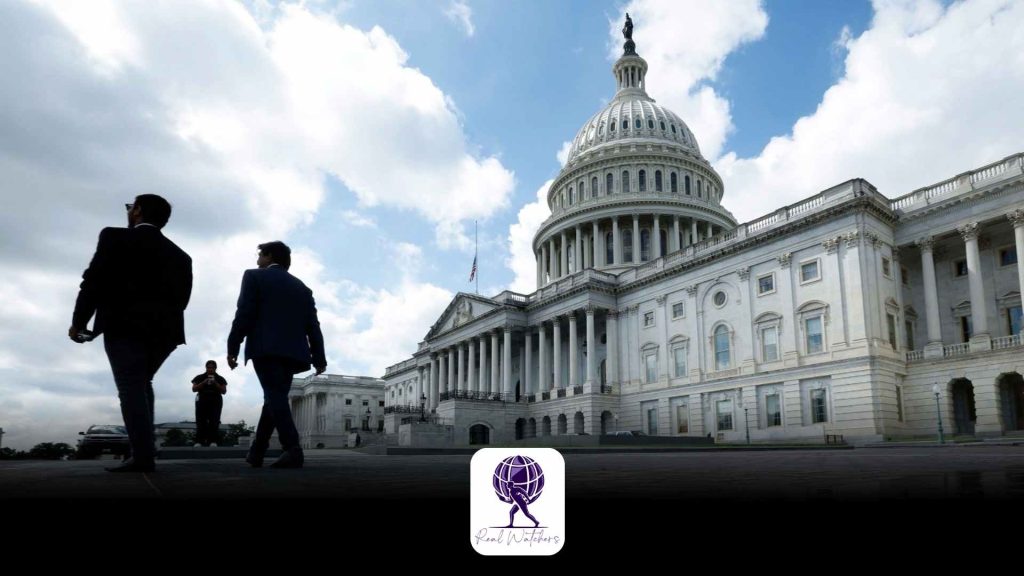The US government has approved a budget to prevent a shutdown, yet the contentious agreement notably omits President-elect Donald Trump‘s request to raise the federal borrowing limit.
On Saturday morning, President Joe Biden officially enacted the spending bill. In a decisive move, the Senate approved the agreement with a vote of 85-11, just moments after the midnight deadline had passed. The House of Representatives gave its approval just hours prior, with a decisive vote of 336 to 34.
In the absence of a funding agreement, millions of federal employees faced the prospect of either being placed on temporary unpaid leave or continuing their work without compensation.
The US government debt has reached approximately $36 trillion (£29 trillion), with current expenditures on interest payments surpassing those allocated for national security.
A shutdown would result in the closure or significant reduction of operations for public services, including parks, food assistance programs, and federally-funded preschools. Additionally, it would restrict support for aid-dependent farmers and individuals recovering from natural disasters.
This week, lawmakers reached a tentative agreement to finance government agencies; however, the deal unravelled following calls from former President Trump and tech mogul Elon Musk urging Republicans to oppose it.
The most recent government shutdown occurred during Donald Trump’s initial presidential term 2019. It lasted 35 days, marking the most extended shutdown in United States history.
The recently passed American Relief Act of 2025 is 118 pages long, a significant reduction from the original 1,547-page bill that was rejected by both Trump and Musk earlier this week. The funding will sustain the US government at existing levels until March 14.
Former President Trump’s proposal to raise the debt ceiling, a contentious issue among Democrats and certain Republican fiscal conservatives, was ultimately excluded from the final legislation. However, Republican leaders have indicated that this measure will be addressed in the upcoming year.
The contentious budget battle is a harbinger of the legislative struggles that could unfold when Trump assumes the presidency next month.
“Attempting to suspend the debt ceiling into the legislation at the last minute was not a viable strategy,” stated House Democratic minority leader Hakeem Jeffries before the vote.
He subsequently commended the bill’s approval, stating, “House Democrats have effectively halted the billionaire boys club.”
The agreement eliminates provisions that Democrats advocated in the initial iteration of the legislation. These include the first salary increase for lawmakers since 2009, reforms in healthcare, and measures designed to curb misleading advertising practices by hotels and live event venues.
The package encompasses $100 billion designated for disaster relief to support recovery efforts following hurricanes and other natural calamities. It also earmarks $10 billion in assistance for farmers.
The plan encompasses complete federal funding for the reconstruction of Baltimore’s Francis Scott Key Bridge, which collapsed in March after colliding with a cargo ship.
Musk, who Trump assigned to reduce government expenditures within his administration, had actively campaigned against the previous iteration of the bill.
During the debate, Republican representatives expressed optimism about entering a “new era” with Donald Trump set to assume the presidency on January 20, alongside Republican dominance in both chambers of Congress. The Senate is presently under the control of the Democratic Party.
The ongoing budget negotiations have put Republican House Speaker Mike Johnson in a precarious position. He is encountering backlash from within his own party, which casts doubt on his ability to secure a vote on January 3 that could determine the future of his leadership role in the chamber.
“We appreciate the unity displayed by all parties in making the right decision. With this matter resolved as the final order of business for the year, we are poised for a significant and crucial new beginning in January,” Johnson told reporters following Friday’s vote.
He noted that he had frequently conversed with Trump and Musk throughout the negotiations.
Musk commended the Louisiana congressman for his budget efforts in a post on X, his social media platform.
“Considering the circumstances, the Speaker performed admirably,” he stated. “The legislation transformed from a hefty document to a streamlined version.”








